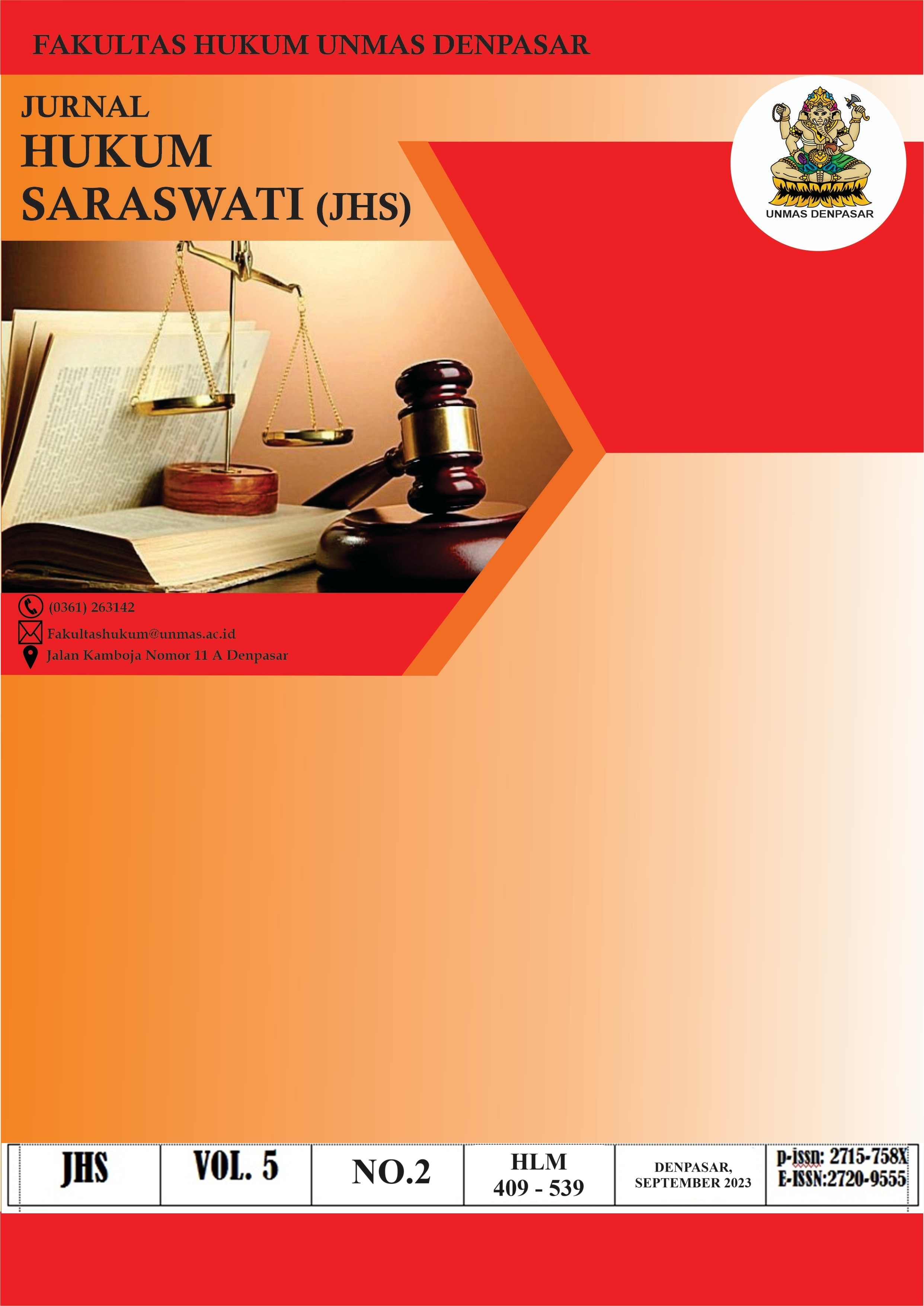TINJAUAN YURIDIS TANTANGAN CROWDFUNDING DALAM RANGKA UPAYA PREVENTIF PENCEGAHAN KEJAHATAN EKONOMI
Keywords:
Peer to Peer Lending, Crowdfunding, Economic CrimeAbstract
Peer to Peer Lending (P2PL) has emerged as a phenomenon in the financial landscape of Indonesia, providing easier access to funding for small and medium-sized enterprises (SMEs). However, this service also brings risks such as financial crimes and data privacy violations. In this context, it is crucial to examine the contractual agreements in P2PL, particularly concerning fairness and legal security for both parties involved. This article proposes an analysis of standard contracts in P2PL, tracing their legal framework and discussing their implications for fairness, utility, and legal certainty. Furthermore, the article highlights the risks of financial crimes in P2PL, including the roles of illegal operators and data privacy breaches. Considering the role of the Financial Services Authority (OJK) in regulating technology-based financial services, this research offers insights into the challenges and opportunities in maintaining the integrity and security of P2PL services in Indonesia.
References
Buku
Achmad Busro, Kapita Selekta Hukum Perjanjian, Yogyakarta: Pohon Cahaya,2013.
Aida Dita Hanifawati, Urgensi Penegakan Hukum Pidana Pada Penerima Pinjaman Kegiatan Peer To Peer Lending Fintech Ilegal Dan Perlindungan Data Pribadi, Jurnal Penegakan Hukum dan keadilan, Vol. 2, No. 2.
Ana Sofa Yuking. 2018. “Urgensi Peraturan Perlindungan Data Pribadi dalam Era Bisnis Fintech”. Jurnal Hukum dan Pasar Modal. Vol. 8, No. 16. Jakarta: Himpunan Konsultan Hukum Pasar Modal.
Assafa Endeshaw, 2007, Hukum E-commerce dan Internet dengan Fokus Asia Pasifik, Pustaka Pelajar, Yogyakarta.
Dr. RH. Wiwoho, 2017, Keadilan Berkontrak, Penaku.
Dr. Muhammad Syaifudding, 2012, Hukum Kontrak Memahami Kontrak dalam Perspektif Filsafat, Teori, Dogmatik dan Praktik Hukum, CV.Mandar Maju, Bandung.
Dwi Arya Dominika, I Wayan Wiryawan, 2016, Akibat Hukum Wanprestasi Dalam Perjanjian Kredit Bank, Vol. 4, No.3, Jurnal Ilmiah Ilmu Hukum Kertha Semaya, Fakultas Hukum, Universitas Udayana, Denpasar.
Jurnal
Eugenia Omarini A, 2018, Peer-to-Peer Lending: Business Model Analysis and the Platform Dilemma, International Journal of Finance, Economics and Trade (IJFET). Vol. 2, Issue 3. Lewes: SciDoc Publisher.
Falahiyati Nurhimmi, Tinjauan Hukum Kontrak elektronik Dalam Pinjam Meminjam Uang Berbasis Teknologi Informasi (Transaksi Peer To Peer Lending), Justiqa Law Rev, Vol 2 No. 1 2020.
Ichwan dan Rahmatina A, Kasri, 2019, “Why Are Youth Intent on Investing Through Peer to Peer Lending? Evidence from Indonesia, Journal of Islamic Monetary Economics and Finance (JIMF), Vol. 5, No.4, Bank Indonesia, Jakarta.
Iga Bagus Prasadha Sidhi Nugraha dan I Gede Yusa, 2020, Jurnal Kertha Semaya, Vol. 8 No. 5.
Kurniawan, 2014, Hukum Perusahaan Karakteristik Badan Usaha Berbadan Hukum dan Tidak Berbadan Hukum Di Indonesia, Genta Publishing, Yogyakarta.
Raden Ani Eko Wahyuni dan Bambang Eko Turisno. 2019. “Praktik Finansial Teknologi Ilegal Ditinjau dari Prespektif Etika Bisnis”. Jurnal Pembangunan Hukum Indonesia. Vol. 1, No. 3. Semarang: Program Studi Magister Ilmu Hukum Fakultas Hukum Universitas Diponegoro.
Sahputra, C., Suhendro, S., & Fahmi, F. (2022). Kebebasan Jual Beli Online (E-Commerce) Menurut Hukum Di Indonesia . Jurnal Panorama Hukum, Vol. 7, 1.
Wuri Sumampouw, Kana Kurnia, Imam Ridho Arrobi, 2021, Perlindungan Hukum Terhadap Usaha Mikro Kecil dan Menengah Pasca Pemberlakuan Undang-Undang Nomor 11 Tahun 2020 tentang Cipta Kerja, de jure, Vol. 13, No 1.
Yesaya Eglesias Paulus, 2018, The Emergence of Peer-to-Peer Lending in Indonesia: A Study of Risk Management Analysis on Conventional Banking Companies, International Journal of Management and Applied Science (IJMAS), Vol. 4, Issue 7, Institute of Research and Journals, Bhubaneswar.
Downloads
Published
How to Cite
Issue
Section
License
- Copyright notice
Authors who publish with this journal agree to the following terms:
- Authors retain copyright and grant the journal right of first publication with the work simultaneously licensed under aCreative Commons Attribution License that allows others to share the work with an acknowledgement of the work's authorship and initial publication in this journal.
- Authors are able to enter into separate, additional contractual arrangements for the non-exclusive distribution of the journal's published version of the work (e.g., post it to an institutional repository or publish it in a book), with an acknowledgement of its initial publication in this journal.
- Authors are permitted and encouraged to post their work online (e.g., in institutional repositories or on their website) prior to and during the submission process, as it can lead to productive exchanges, as well as earlier and greater citation of published work (See The Effect of Open Access).







